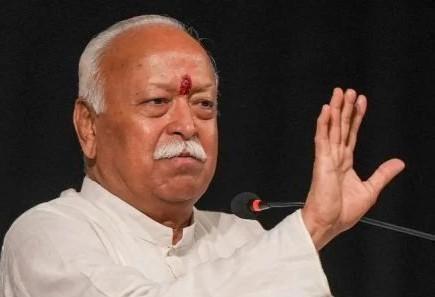
If someone turns to evil then we’ll teach lesson: Bhagwat on J&K attack
India has been grappling with the issue of terrorism and extremism for decades, and the recent terror attack in Pahalgam, Jammu and Kashmir, has once again brought the country to the brink of chaos. In the wake of this devastating attack, the RSS chief, Mohan Bhagwat, has made some significant remarks that have sent shockwaves across the nation. Speaking at a function in Nagpur, Bhagwat stated that non-violence is India’s religion, but so is teaching a lesson to “oppressors and hooligans.”
The RSS chief’s statement has sparked a heated debate, with many questioning the morality and efficacy of his words. On one hand, Bhagwat’s assertion that non-violence is India’s religion is a reflection of the country’s rich spiritual heritage and its commitment to non-violent resistance. India has indeed been a beacon of non-violence, with Mahatma Gandhi’s philosophy of non-violent resistance inspiring movements across the world.
On the other hand, Bhagwat’s statement that teaching a lesson to “oppressors and hooligans” raises concerns about the nature of this lesson and the methods that will be employed to impart it. The phrase “teaching a lesson” is often associated with punitive measures, and the use of the word “hooligans” to describe those who engage in violence or terrorism is a pejorative term that jars with the values of non-violence and compassion.
Bhagwat’s statement, however, needs to be seen in the context of the prevailing situation in Jammu and Kashmir. The region has been plagued by terrorism and violence for decades, with various groups using armed insurgency to push their political and ideological agendas. The recent terror attack in Pahalgam, which resulted in the deaths of several innocent civilians, is a stark reminder of the devastating consequences of this violence.
In this context, Bhagwat’s statement can be seen as a call to action, urging the government to take concrete steps to protect the people of Jammu and Kashmir from the scourge of terrorism. The RSS chief’s emphasis on the need to “teach a lesson” to those who engage in violence is a reflection of the frustration and anger that many Indians feel in the face of such brazen terrorist attacks.
However, it is essential to note that any response to terrorism must be guided by the principles of non-violence and compassion. The use of violence or punitive measures to combat terrorism can often exacerbate the situation, leading to a cycle of violence and retaliation that benefits no one.
The Indian government has, in fact, been taking a nuanced approach to addressing the issue of terrorism in Jammu and Kashmir. The Centre has been engaging with various stakeholders, including separatist leaders and civil society groups, to address the political and economic grievances that underlie the insurgency. The government has also been implementing measures to improve the security situation in the region, including the deployment of additional security forces and the implementation of counter-terrorism strategies.
In this context, Bhagwat’s statement can be seen as a call to the government to take a firmer stance against terrorism, while also emphasizing the need to address the root causes of the insurgency. The RSS chief’s assertion that “we never harm or disrespect our neighbours, but if someone is bent on being evil, what is the cure?” is a reflection of the Indian government’s commitment to maintaining good relations with its neighbours, while also taking concrete steps to protect its citizens from the threat of terrorism.
The king’s duty is to protect the people, and he will do his duty, Bhagwat added. This statement is a reflection of the Indian government’s duty to protect its citizens from harm, and to ensure their safety and security. The government has a responsibility to take concrete steps to prevent terrorist attacks, and to hold those who engage in such acts accountable for their actions.
In conclusion, Bhagwat’s statement on the J&K attack is a reflection of the complexity of the situation in the region. While non-violence is indeed India’s religion, the need to address the threat of terrorism and extremism cannot be ignored. The Indian government must take a nuanced approach to addressing this issue, one that balances the need to protect its citizens with the need to address the root causes of the insurgency. As Bhagwat said, if someone turns to evil then we’ll teach lesson, but this lesson must be guided by the principles of non-violence and compassion.
Source: https://youtu.be/SpAKVWl5wII



